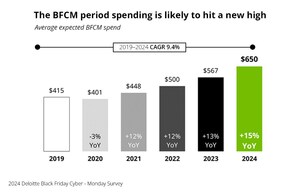The Impact of America's Debt Crisis is Likely More Severe than Forecasts Indicate, Deloitte Study Reveals
Unexamined risks of U.S. debt to impact America's growth
WASHINGTON, June 4, 2012 /PRNewswire/ -- The challenge presented by America's debt crisis is likely more severe - and immediate - than the current baseline Congressional Budget Office (CBO) forecast indicates, says new research from Deloitte. The accumulating U.S. debt burden will consume resources which could otherwise be used to make key domestic investments over the next decade; is extremely sensitive to changes in baseline economic and policy assumptions; and could potentially impact the independence of monetary policy.
Current CBO estimates show the national debt accruing at a rate of roughly $4 billion per day, which translates to approximately $750 per U.S. household per month, or a fifth of the average household's monthly income. Considering the nation has already accrued about $140,000 in debt per taxpayer, the financial outlook is daunting at best.
"During an election year, one of the few things both the Democratic and Republican Presidential candidates seem to agree on is that our growing debt burden is reaching a crisis point," says Robin Lineberger, CEO Federal Government Services, Deloitte LLP. "However, it is unclear if the issue will get the public attention it deserves. From our perspective, there are an array of long-term debt solutions that have already been proposed which could help to resolve the crisis. The challenges get far more difficult to solve over time which argues for taking action now."
The study, titled "The Untold Story of America's Debt," argues that the public dialogue on the debt is largely taking place on the surface and in sound bites lacking the nuanced consideration that such a complex topic deserves. The study reveals the unexamined debt related risks the country is facing which pose a critical threat to America's long-term growth. According to the report, the risk concerns fall into five major categories:
- The debt crisis is likely bigger than you think: Current baseline projections make a host of optimistic assumptions that may not come to pass. If the Bush tax cuts do not expire and Congress reverses the cuts to Medicare, the debt becomes much larger.
- The magnitude of the debt is highly sensitive to economic fluctuations: America's reliance on short-term debt – with $2.6 trillion in debt slated to be refinanced at least once in the next two years – makes it highly vulnerable to interest rate fluctuations. Additionally, if GDP fails to match targeted high growth levels it would further increase the debt.
- The debt could adversely impact American competitiveness: The U.S. is on track to spend at least $4.2 trillion in interest payments over the next decade, a massive amount of money that could otherwise be used to make investments that could boost America's competitiveness. If recent discussions surrounding the debt ceiling are any indication of future behavior, the areas of government most closely connected to competitiveness – non-defense discretionary spending on R&D, infrastructure, education and training – are expected to be the biggest targets for continued cuts.
- The rising debt could impact the independence of monetary policy: As interest payments on U.S. debt consume a growing share of the national budget, the demand for Congress and the executive branch to apply political pressure on monetary policy with the goal of realizing preferred fiscal and policy outcomes will likely increase.
- The demand for and composition of America's debt is not just America's decision: Foreign lenders own nearly half of publicly held U.S. debt. It is assumed that such debt holders have insatiable appetites for U.S treasuries. Should global lenders stop buying treasuries and invest their money elsewhere, this would force abrupt and painful changes in government spending.
The core question is whether political courage and policy innovation can prevail over entrenched thinking and our unwillingness to admit the real costs of the U.S. debt. How America responds will determine whether the next decade represents a long-term decline in competitiveness or a new path to growth.
"The Untold Story of America's Debt" is the first in a series of Deloitte studies to be published before the 2012 election. Some of the topics that will be explored in the series include: health care reform, the role of manufacturing in U.S. competitiveness, energy independence and government transformation. Visit www.deloitte.com/us/leadstrong for research-based, non-partisan insights for public and private sector leaders on these and related issues.
To download a copy of the full report, go to "The Untold Story of America's Debt www.deloitte.com/us/debttheuntoldstory
As used in this document, "Deloitte" means Deloitte LLP and its subsidiaries. Please see www.deloitte.com/us/about for a detailed description of the legal structure of Deloitte LLP and its subsidiaries. Certain services may not be available to attest clients under the rules and regulations of public accounting.
SOURCE Deloitte
WANT YOUR COMPANY'S NEWS FEATURED ON PRNEWSWIRE.COM?
Newsrooms &
Influencers
Digital Media
Outlets
Journalists
Opted In





Share this article